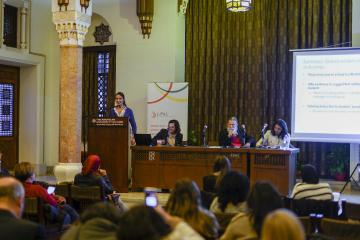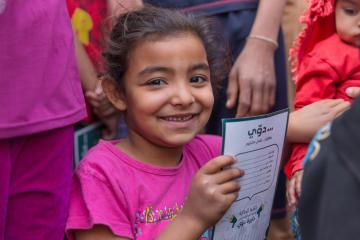
Toward an evidence-informed development agenda for Egypt: Fostering government-research partnerships

Egypt’s Vision 2030 outlines the government’s top policy priorities. Applying lessons from rigorous global evidence can help improve the effectiveness of policies to reduce poverty and achieve these ambitious development goals in Egypt.
Over the past two years, J-PAL Middle East and North Africa (J-PAL MENA) at The American University in Cairo (AUC) and UNICEF Egypt held four Global Evidence for Egypt seminars to foster dialogue on how lessons from randomized evaluations can help inform decisions around overcoming youth unemployment, strengthening the education system, designing adaptive social assistance programs, and shifting social and gender norms in Egypt. As our partnership with UNICEF Egypt continues, future seminars will focus on emerging questions that matter most for the Government of Egypt.
On November 15, 2021, J-PAL MENA at AUC co-hosted a roundtable discussion with UNICEF Egypt titled “Towards an evidence-informed development agenda for Egypt: Fostering government-research partnerships.” The roundtable aimed to identify key development priorities across the Government of Egypt and hone in on areas where evidence can add the most value in meeting national development goals. This roundtable (watch here) launched the new phase of the Global Evidence Series partnership and will shape the direction of the next set of seminars that J-PAL MENA at AUC and UNICEF Egypt will co-host over the coming year.
The roundtable featured presentations and discussion from H. E. Dr. Nevine El-Kabbag, Minister of Social Solidarity in Egypt; Rema Hanna, Jeffrey Cheah Professor of South-East Asia Studies at Harvard University and J-PAL Southeast Asia Co-Scientific Director; Jeremy Hopkins, UNICEF Representative in Egypt; Samer Atallah, Associate Dean of AUC School of Business; and was moderated by Alison Fahey, Executive Director of J-PAL MENA at AUC.
The discussion also featured key officials representing entities across the Government of Egypt, international development agencies, and academia. Participants were invited to highlight their organizations’ development priorities and their reflections on areas where global evidence from randomized evaluations would be most useful to inform decision-making processes.
Using evidence to address priorities in labor markets, gender, health, education, and climate change
Partnering with the Government of Egypt to build links between research and policy and promote a culture of evidence use can play a role in directing the future of investments in social development, ultimately helping Egypt achieve its development goals. Panelists as well as participants in the roundtable emphasized the need for sustainable partnerships that bring researchers and policymakers together to bridge the gap between data, evidence, and government decisions.
In her remarks, H. E. El-Kabbag highlighted that the Ministry of Social Solidarity incorporates evidence at various stages of its decision making processes, from setting an agenda to its implementation, emphasizing that evaluation helps measure the real impact of social assistance programs on the lives of individuals. She added that with national developmental initiatives such as “Haya Karima” (Decent Life), poverty figures across governorates will change on a daily basis, creating a need for developing a rigorous mechanism to gather and analyze data to understand the impact of invested resources.
Panelists and participants representing ministries, development agencies, and academia agreed on the importance of timely data collection and analysis as well as the accessibility of reliable data in order to improve services and social policy. Investing in human capital and creating an enabling environment for research and data collection and translating this research to action is thus a priority to help Egypt achieve its development goals.
The discussion among panelists and participants identified priority topics that will guide the direction of the next seminars. Measuring and addressing the learning losses that have resulted from the pandemic is a top priority for Egypt’s policymakers. Egypt is also on a fast digitization track; learning from global best practices is vital to ensure that this process is inclusive and beneficial to the poor. Equally important, investing in family planning and development to curb the rising population rate in Egypt will continue to be a national priority. Water scarcity, usage, and management was also highlighted as a major challenge facing Egypt today, underscoring the need for encouraging dialogue around climate change in the region.
Other development priorities for Egypt highlighted in the discussion included revisualizing social safety nets, improving female labor force participation, promoting early childhood development, addressing norms to encourage behavior change, and protecting the rights of people with disabilities.
The goal of the next round of seminars will be to bring these priorities together with existing evidence that can help inform the design of innovative programs spearheaded by the Government of Egypt.
Influencing large-scale policy decisions with evidence
Programs that were rigorously evaluated and which have proven to be effective in reducing poverty have been scaled up to reach over 540 million individuals worldwide, and evidence has influenced policy thinking on important questions in development. To illustrate how working with the government to co-design evaluations of major poverty reduction programs can lead to useful insights that inform government decisions, J-PAL affiliated professor Rema Hanna shared several compelling examples from her work in Indonesia.
J-PAL affiliates worked with Raskin, Indonesia’s biggest food subsidy program, to evaluate the impact of providing identification cards with information on program benefits. They found that cards increased the total benefits eligible households received, and adding price information increased card effectiveness. In 2013, the Government of Indonesia leveraged the results of this evaluation to expand social protection identification cards, reaching 66 million individuals and improving access to social assistance.
Within the same framework, J-PAL affiliates worked with the Government of Indonesia to evaluate the impact of transforming a targeted social assistance program that reaches 15 million individuals through in-kind transfers to a non-cash food assistance program. Researchers found that vouchers reduced poverty among the poorest households by 20 percent and reduced administrative costs to deliver benefits. The results of the evaluation encouraged the Government of Indonesia to continue digitizing the program, reaching 18.8 million households.
Similarly, researchers partnered with the Government of Indonesia to evaluate the impact of information campaigns and incentives on informal sector workers’ enrollment into a national health insurance scheme. The results of the study indicate that providing full subsidies increased enrollment by 11.6 percent and attracted healthier households. The government incorporated these results in its decisions by rolling back its plans to increase premiums in 2016.
Overall, through partnerships with J-PAL and our affiliates, the Indonesian government has obtained immediately useful and contextually appropriate guidance on how to adapt and scale programs to improve outcomes and use scarce resources well.
J-PAL MENA at AUC is committed to engaging with the Government of Egypt, international development agencies, and non-governmental organizations to produce timely research on knowledge gaps and to use evidence to guide solutions to Egypt’s development challenges. In doing so, J-PAL MENA at AUC and UNICEF Egypt will continue to bring policymakers together with J-PAL affiliated professors in constructive dialogues that contribute to the government’s policy agenda.
Subscribe to J-PAL MENA’s newsletter and follow us on Twitter, Facebook, and LinkedIn to learn about future events and seminars.
Related Content

Strengthening the Egyptian education system: A recap from the Global Evidence for Egypt spotlight seminar on education

Improving the Transparency and Delivery of a Subsidized Rice Program in Indonesia

